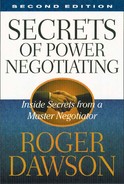Chapter 25
Unethical Gambits: Planted Information
Returning from a speaking engagement, I was discussing the presidential press conference with my seat mate. “I don’t believe he’s telling the truth,” he told me. “I met a man who knew someone who works at the White House, and he told me the president did know all about it all along. He’s covering something up.” What amazed me about this was I found myself believing what this man was telling me, rather than believing what I had earlier heard the president of the United States say at the press conference. Why? Because we tend to believe information we have obtained surreptitiously.
Planted information can be an astoundingly powerful influencer. A salesman is making an impressive presentation to a board of directors. Flip charts and audio visual aids surround him. He is fervently making a plea that they go with his company because it offers the best value in the marketplace. He believes that no competitor can undercut his prices and feels confident that he can close the sale at his asking price of $820,000—until he sees one of the directors pass a note to another director who nods and lays the note on the table in front of him.
Curiosity gets the better of the salesman. He has to see what’s on that note. He finishes his presentation, then approaches the table and dramatically leans toward them. “Gentlemen, do you have any questions?” Out of the corner of his eye, he can now see the note. Even reading upside down, he can see that it says, “Universal’s price is $762,000. Let’s go with them.”
The chairman of the board says, “I do have one question. Your price seems high. We’re obligated to go with the lowest price that meets our specifications. Is $820,000 the best you can do?” Within minutes, the salesman has lowered his price by $58,000.
Was the note real or was it planted information? Although it was just an unsubstantiated note scrawled on a piece of paper, the salesperson believed it because he obtained the information surreptitiously. Even if they had planted it, could the salesperson cry foul later? No, because they didn’t tell him that the competition’s bid was $762,000. He obtained the information surreptitiously, and he must accept responsibility for his assumptions.
Simply knowing about planted information will help you to diffuse this unethical tactic. Any time that you are negotiating only based on information that the other side has chosen to tell you, you are extremely vulnerable to manipulation. When the other side may have planted the information for you to discover, you should be even more vigilant.
Negotiating Principles
In the next eight chapters, I’m going to teach you the fundamental principles of negotiation—the things that apply to every negotiation, every time. They may not be as direct and as clear cut as the negotiating gambits that I’ve taught you, but if you’ll completely absorb what I’ll teach you, you’ll see how smoothly things go for you and how much fun negotiation can be when you do it right.
Unlike the Gambits that are used as the need arises, these principles are always at work for you and will help you smoothly get what you want when you negotiate.
